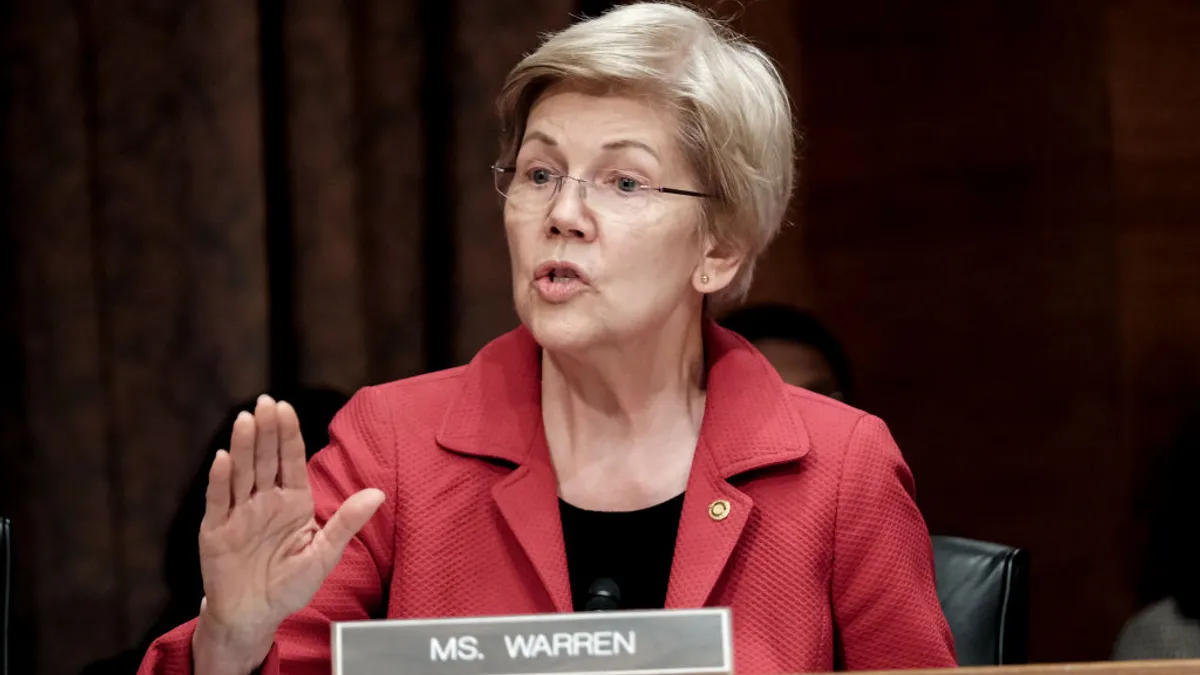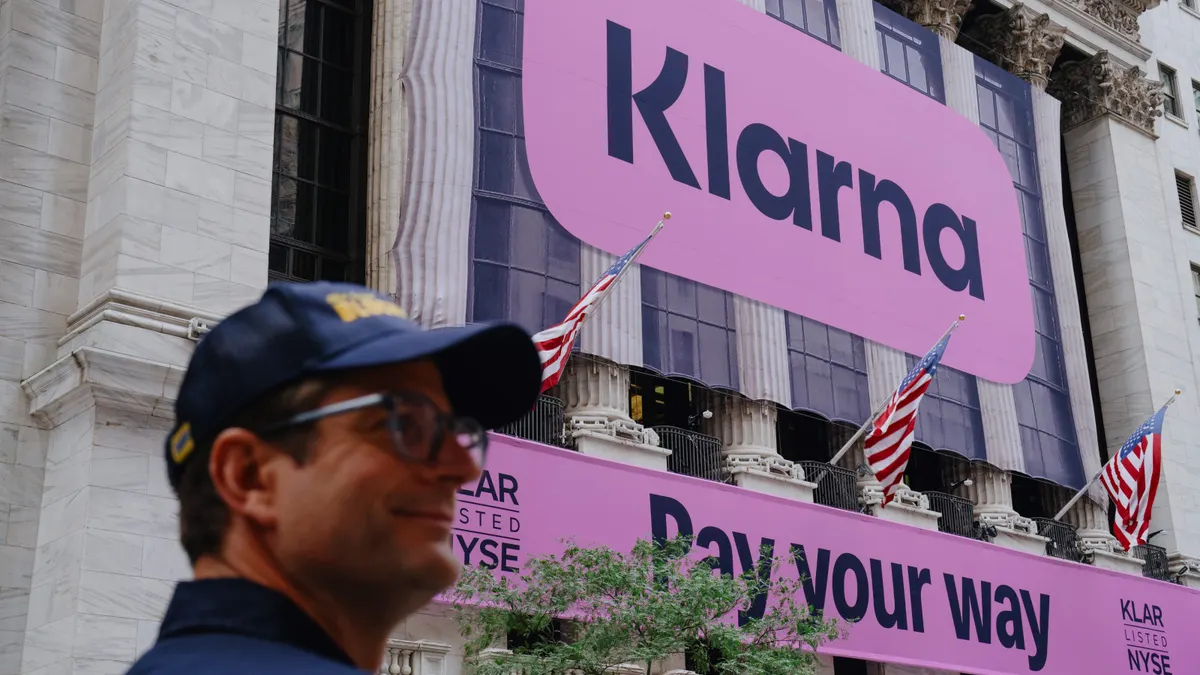Sen. Elizabeth Warren, D-MA, and Rep. Maxine Waters, D-CA, urged the Federal Reserve to reconsider its approval of Capital One’s proposed $35.3 billion acquisition of Discover, according to a Thursday letter.
The central bank’s assessment insufficiently considered the transaction’s effects on low-income consumers, competition and financial stability in the U.S., and failed to include relevant information from the Justice Department, Federal Deposit Insurance Corp. and Consumer Financial Protection Bureau, the lawmakers wrote.
Warren and Waters cite a Fed board rule under which the seven-governor panel may reconsider an application if it receives a written request to do so from “any party to such application” within 15 days of a deal’s approval. Warren and Waters – the ranking members of Senate Banking Committee and House Financial Services Committee, respectively – assert that because they submitted comments on the application, they qualify as parties.
The board may deny reconsideration outright, but the lawmakers are asking that the governors vote on further action – perhaps banking that they break along party lines. The Fed board now has four Democrats and three Republicans.
Warren and Waters lambasted the Fed’s “analysis, or lack thereof,” adding that the approval “displayed a troubling lack of rigor with unsupported conclusions that ran counter to the factual record.”
The lawmakers noted that the vast majority (91%) of the more than 6,100 public comments on the application opposed the deal. The Fed, in its order, said many were “substantially identical form letters that raised concerns related to competition and financial stability generally.”
Warren and Waters, however, said the board “repeatedly parroted assertions made by Capital One in its application, instead of substantively grappling with commenters’ analyses and the market realities of the transaction.”
Competitive effects
The lawmakers argued the Fed unwisely evaluated the competitive effects based on deposit market concentration.
“Treating the transaction as a traditional bank merger was deeply misguided,” Warren and Waters wrote. “These are not two traditional banks – they are credit card giants. Discover does not even have bank branches.”
The Fed’s competitive effects analysis did not appear to take credit cards into account, the lawmakers wrote.
For customers with no or limited credit history, the Fed found “the post-merger [Herfindahl-Hirschman Index] would increase by 766 points to 1971 … and Capital One would control 40 percent of this segment,” the lawmakers wrote.
The DOJ last year withdrew guidelines leaning heavily on HHI on the idea that the measure is outdated, Warren and Waters noted. But even using them, a transaction that boosts HHI by 200 points or scores above 1,800 generally has been flagged as anticompetitive, the lawmakers wrote.
Warren and Waters threw doubt on the Fed’s claims that it conducted a high-level analysis of the transaction’s impact on credit card consumers.
“Nowhere in any of the competitive effects analyses did the Board even attempt to evaluate whether fees, credit availability, interest rates, or non-price harms like customer service would be impacted by the deal,” the lawmakers wrote. “The Order reads like the Board had predetermined it was going to approve the transaction and either ignored relevant facts or explained them away with baseless assertions copied and pasted from Capital One’s application.”
CFPB, FDIC input
Warren and Waters argued, too, that the Fed’s analysis of community benefits “primarily focused on each bank’s past performance under the Community Reinvestment Act” but “neglected to evaluate how the combined institution would serve communities on a going forward basis.”
The central bank also “ignored the facts outlined in the CFPB’s 2025 lawsuit against Capital One for allegedly cheating millions of consumers out of more than $2 billion in interest,” the lawmakers wrote.
“Instead of evaluating the facts outlined in the CFPB’s legitimate complaint, the Board buried in a footnote that the CFPB voluntarily dismissed the case (like it tried to dismiss 1,483 of its 1,690 staff),” Warren and Waters wrote in a reference to attempts by Trump-era leadership of the bureau to radically downsize itself.
While on the subject of regulators, Warren and Waters noted that the Fed, in its approval order, acknowledged consulting with the FDIC and CFPB. However, “it is not clear from the Order whether the information and analyses in these formal communications were part of the factual record and presented to the Governors in their review of the transaction,” the lawmakers wrote.
They asked that the communications from the FDIC and CFPB to the Fed be made public. The lawmakers also requested that the DOJ’s communication to the Fed during the Biden administration be made public.
SVB x2?
Warren and Waters also asserted the Fed underestimates the effect a Capital One-Discover combination would have on financial stability in the U.S.
The resulting $637 billion-asset bank “would not appear to result in meaningfully greater or more concentrated risks to the stability” of the U.S. financial system, the Fed concluded.
Capital One, after the transaction, would be larger than Silicon Valley Bank, Signature and First Republic combined, Warren and Waters noted.
“When SVB acquired Boston Private two years before its failure triggered a banking crisis, the Board similarly concluded that ‘this transaction would not appear to result in meaningfully greater or more concentrated risks to the stability of the U.S. banking or financial system,’” the lawmakers wrote.
However, they fault the Fed for relying “heavily on ‘global’ metrics of systemic risk,” rather than focusing on the U.S.
“Under this misapplied analytical approach,” the Capital One-Discover deal would be “well below” the global systemically important threshold but “would have a systemic risk score double SVB’s,” Warren and Waters wrote.
The lawmakers also asked that the Fed reevaluate the competitive effects of the deal using data from the first quarter of 2025, rather than mid-2024 or late 2023 – and that the central bank incorporate large-bank credit card and mortgage data recently published by the Philadelphia Fed.
Further, Warren and Waters repeated, as a concern, recent efforts to drastically downsize the CFPB.
“The [Fed] cannot force the CFPB’s Acting Director to run the agency lawfully, but it certainly can refrain from creating the largest credit company in the country at a time of massive uncertainty regarding the CFPB,” the lawmakers wrote.
Warren and Waters also noted the Department of Government Efficiency’s incursion at the FDIC as a development after the Fed considered the Capital One-Discover deal.
“Keeping Capital One and Discover separate makes them easier to resolve and somewhat mitigates the impact of the degradation of the FDIC’s resolution capacity,” the lawmakers wrote.





















